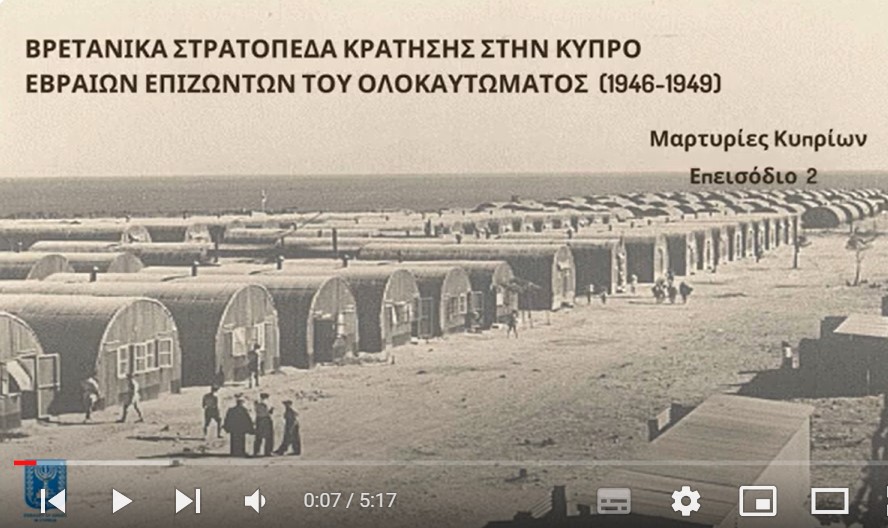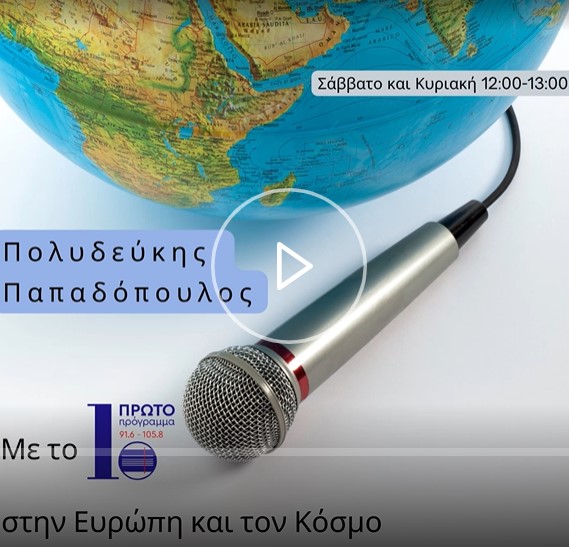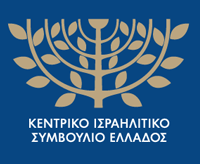
- Informations
On the occasion of the 75th anniversary of the closure of the camps in Cyprus where Jewish Holocaust survivors who tried to immigrate to then British Mandate Palestine were held, the Embassy of Israel in Cyprus edited a series of short video interviews with testimonies of Cypriots from the time.
The material is published and shown for the first time.
SOURCE: X Embassy of Israel in Cyprus

- Informations
The journalist Victor Is. Eliezer, correspondent in Greece of the Israeli newspaper Yedioth Ahronoth, spoke on ERT radio and on Polydevkis Papadopoulos' show "With the First in Europe and the World" (29.7.2023), analyzing the facts of the crisis in Israel following the judicial reform. listen up here the interview (audio file at the end of the article).
The main points of the interview of B.I. Eliezer posted on her website ERTnews (2.8.2023), edited by Polydevkis Papadopoulos and republished below:
Is democracy in Israel at risk?
THE PROCEDURE AND THE CONTENT OF THE REFORM-COURT RECORD?
Finally, after procedures and discussions of about seven months, with 64 votes in favor and zero against in a total of 120 seats (that is, with the votes of only the government majority in the Knesset, the Israeli Parliament and the absence of all opposition MPs) it passed on Monday 24/7 /23 the first main part of the judicial reform.
Mr. Eliezer is asked what it contains, when it will start to be implemented, if it can be blocked and what are the remaining strands? And finally, once the reform is finalized, if the heavy characterization that it is a "Judicial Coup Law" is true, as the country's historical newspaper Haaretz calls it. And as he explains, the main thing is that the reform changes the balance between executive and judicial power in Israel. And this in a state that does not have a Constitution and where the 'constitutional framework of good governance' is determined and adjusted by the spirit that governs the jurisprudence of the Supreme Court, whose powers are now curtailed.
More: B.I. ELIEZER ON ERT RADIO ABOUT JUDICIAL REFORM IN ISRAEL
- Informations
SUNDAY STEP, 2.4.2023 by journalist Victor Isaac Eliezer
The Declaration of Independence of the State of Israel symbolizes the establishment of the state in 1948 and enshrines in the clearest way its Jewish character and its democratic state that respects the rights of all citizens regardless of color, race, religion or gender.
One of Israel's greatest assets in its 75th year was the sense that it still retained its moral ground. It was still this small country that was fighting the enemies that had surrounded it to wipe it off the map and yet, it found a way to thrive.
To the world, Israel has always had a powerful narrative. It is the story of an ancient people who had returned to their historic homeland and against all odds not only survived, but persevered and thrived, despite suffering culminating in the Holocaust. The Jewish people created a vibrant democratic society that was diverse, multicultural and innovative. Israel had to fight often for its existence and for the safety of its citizens, but even so, it was a country that did not waver. The democratic character of the state was indisputable and non-negotiable.
Over the past 12 weeks, Israel has been plunged into chaos and despair as a result of the rapid enactment of laws that upset the existing balance between the legislative, executive and judicial powers, with hundreds of thousands of Israelis from all walks of life protesting in the streets and with a negative economic and political impact on the country.

- Informations
The relationship between Greece and Israel remains strategic and will not be affected by the parallel effort to normalize relations with Turkey, says Israel's new ambassador Noam Katz in his first interview with "K" after assuming his duties in Athens. According to Mr. Katz, with the return of Benjamin Netanyahu - architect of the Greece - Israel relationship - to the prime ministership, new initiatives will follow.
All Greek governments, from leftist to conservative, have supported strategic cooperation with Israel. Does the same apply to Israel?
Clearly yes. The relationship from the Israeli perspective is strategic. We made some changes in our government. We had some volatility. But our relations continue to be strong. Think back to the last few weeks. We had the visit of the Minister of Defense, the visit of the general secretary of the ministry. The number of delegations that came from Greece to Israel and from Israel to Greece was a record number, when I compare it with European countries and the USA combined. Our relationships are strong in other areas as well, not just those led by others. We expect a new government in Israel in the coming days or weeks. This government will commit to building the relationship with Greece. The elected prime minister of Israel was the architect from the Israeli side for the reconstruction of the relationship with Greece. This will be part of his new agenda as prime minister. I hope we will be able to see some joint activities and meetings with the new government.
More: INTERVIEW OF ISRAEL'S AMBASSADOR on "K": TURKEY DOES NOT AFFECT THE ALLIANCE WITH GREECE
- Informations
of the journalist Victor Is. Eliezer
After November 1, 2022, Israel changed. It is no longer the state in which the Far Right is on the fringes of the political map. The Israeli Far Right, with its racist and populist European characteristics, took third place in the Israeli parliament, overturning basic social and moral agreements that had been adopted for the creation of the state: A home state for all Jews, a democratic state that ensures the equal rights of all its citizens regardless of color, race or creed.
The election results
The "Right" bloc was voted by 2.304.000 voters and received 48,36 of the votes. The bloc of "Change" was voted by 1.876.572 voters, a percentage of 38,19%. Arab parties were voted by 510,670 voters, 10,72%. In summary, the coalition of the Right led by Benjamin Netanyahu was voted by 48,36% and won 64 seats, while the coalition of opposition parties was voted by 48,91% but took only 56 seats in the 120-seat Knesset.
- Informations
 On the occasion of Israel's 74th birthday this year, we publish the article "The State of Israel: an example to follow", written by Andreas N. Angelakis, Polish water resources engineer, agronomist and member of the World Water Resources Society and Gideon Oron, University Professor Emeritus Ben-Gurion of the Negev. The article contains interesting facts about Israel's achievements in science and technology and was first published on the news portal of Crete www.patris.gr:
On the occasion of Israel's 74th birthday this year, we publish the article "The State of Israel: an example to follow", written by Andreas N. Angelakis, Polish water resources engineer, agronomist and member of the World Water Resources Society and Gideon Oron, University Professor Emeritus Ben-Gurion of the Negev. The article contains interesting facts about Israel's achievements in science and technology and was first published on the news portal of Crete www.patris.gr:
The State of Israel was founded in 1948. It has a population of 9.293.900, an area of 20.77 km2 and is located in the eastern Mediterranean. Before its establishment, Theodor Herzl (1860-1904), founder of political Zionism, who promoted the idea of a modern Jewish state in the land of Israel, envisioned a state that would not only be the natural homeland of the Jewish people, but also an important intellectual, cultural and scientific center. When the State of Israel was founded, the scientific and technological infrastructure of the country was already planned, which facilitated its further and rapid organization.
- Informations
.jpg) The last week of March was marked by the historic meeting in the Negev desert involving the foreign ministers of Israel, Egypt, Bahrain, Morocco and the United Arab Emirates. In the same week, 11 Israelis were killed in armed attacks by Arab extremists. These two events – the Negev meeting and the terrorist attacks inside Israel – highlight important developments in the region.
The last week of March was marked by the historic meeting in the Negev desert involving the foreign ministers of Israel, Egypt, Bahrain, Morocco and the United Arab Emirates. In the same week, 11 Israelis were killed in armed attacks by Arab extremists. These two events – the Negev meeting and the terrorist attacks inside Israel – highlight important developments in the region.
The first development relates to the dynamic spread of Islamic fanaticism from Palestinian cores in the West Bank to Arab enclaves within Israel. So it was established that members of the Islamic State who claimed responsibility for the attacks in Khedera and Beersheba were Israeli Arabs. This fact further exacerbates the already disturbed relations between Jews and Arabs within the state of Israel itself, despite the honorable efforts of the new government in which the Arab Raham party also participates. Her politics "financial well-being" applied by Israel in recent years in the West Bank of Jordan, i.e. in the territories controlled by the Palestinian Authority, may have raised a rampart against a generalized popular uprising, but in no case can it exclude "individual strikes", which as proved in the last week of March, they can spread death even in large urban centers of Israel.

